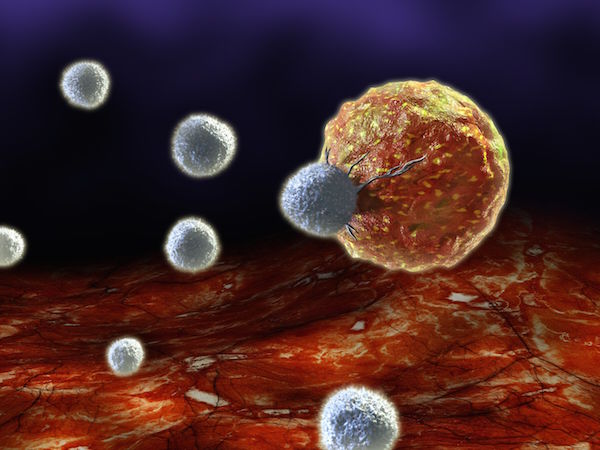FRIDAY, June 3, 2016 (HealthDay News) — A new drug therapy shows promise for treating triple-negative breast cancer, an especially aggressive form of the disease, researchers say.
A recent trial — the second of three needed for approval in the United States — found the treatment halted cancer progression for nearly six months, twice as long as other treatments, the researchers reported.
The experimental approach pairs an antibody drug with chemotherapy.
“The antibody drug finds the cancer cells and delivers the chemotherapy only to those cancer cells,” said study researcher Dr. Aditya Bardia, an attending physician at Massachusetts General Hospital Cancer Center. “That is why we are able to give a high dose of chemotherapy to the cancer cells.”
The regimen, called sacituzumab govitecan (IMMU-132), acts like a “smart bomb,” the researchers said.
The antibody targets a protein known as Trop-2 that’s found in most triple-negative breast cancers. Targeting the protein keeps damage to surrounding healthy tissues to a minimum, Bardia said.
Extending progression-free time to nearly six months “is really significant,” said Dr. Linda Bosserman, an assistant clinical professor at the City of Hope Medical Group in Rancho Cucamonga, Calif. She did not participate in the study.
Bosserman said the researchers found potentially long-term disease control for some patients.
If the results bear out, she added, “I’d have patients lining up to get this, because it has tolerable, treatable side effects with significant disease control, so they can have improved quality of life.”
The U.S. Food and Drug Administration has given the new drug “breakthrough” status, a distinction used to expedite review of promising new treatments for life-threatening conditions. A phase 3 study — the final phase needed for approval — is planned, Bardia said.
As many as one in five breast cancers are triple-negative, Bardia said. They are so named because they lack the “receptors” known to fuel most breast cancers, including estrogen, progesterone and HER2 receptors.
Currently, there is no standard chemotherapy for triple-negative breast cancers that have spread, relapsed and are resistant to treatment. The drugs doctors usually use against breast cancer aren’t very effective for this fast-growing disease, which recurs quickly. In general, they stop the cancer from progressing only for a few months, the researchers said.
On the new intravenous treatment, however, “the progression-free survival was 5.6 months, about twice as long as one would anticipate with standard chemotherapy,” Bardia said.
Median survival (half longer, half less) was 14.3 months, Bardia reported. With standard cancer drugs, median survival is about 10 to 13 months, the researchers said.
The researchers gave the drug to 62 patients with at least two previous cancer treatments. The participants got the drug once a week for two weeks in 21-day cycles until progression resumed.
About one-third had tumor shrinkage of 30 percent or more, which is termed a partial response. Two had complete remission, the researchers reported.
The two most common side effects were low white blood cell counts and diarrhea. “Both were manageable,” Bardia said. No one dropped out due to side effects.
The study was funded by Immunomedics, Inc., the drug’s maker. The results were scheduled for presentation Friday at the annual meeting of the American Society of Clinical Oncology, in Chicago. Studies presented at medical meetings are viewed as preliminary until the findings can be peer-reviewed.
More information
To learn more about triple-negative breast cancer, visit the American Cancer Society.
Copyright © 2026 HealthDay. All rights reserved.

